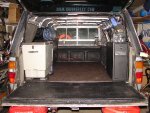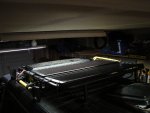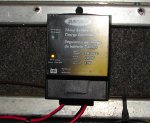Grim Reaper said:
Brian:
I looked on your site and didn't find any information about your solar set up. I'm looking at doing something like you have for maintaining the battery on my tow rig and camper.
Do you have any more information on your set up? sounds about the right size for my needs.
These are basic pictures of the set up. It's not necessarily cost effective, but it's extremely simple. I purchased two 15 watt panels, that are generally good for about 1 amp each under ideal conditions. Wiring them together they basically act as one panel good for 30 watts or 2 amps. I used this very simple and cheap controller to manage the voltage.
The panels have diodes built in so that the battery can't drain out through the panels. The controller basiclly kicks in at 13 volts and allows the panels to charge the battery. At 14.2 volts, the controlled kicks off disconnecting the panels so that they don't accidently overcharge the battery.
What kind and how many panels you need depends on what you want to use it for. What I would do is put an amp meter between your battery post and main battery lead and either check the readings with everything off, if you're trying to prevent drain over a long period of time, or turn on the things you might want to have turned on with the solar panels hooked up. Like for me I turned on my refrigerator and discovered that it used about 3 amps, although it kicks down a little bit after it's cooled to a point.
If you don't want the battery to discharge at all, while running one of these accessories, then you'll need panels that put out at least as much amperage, but since ideal solar conditions are rare, you'd need perhaps as much as double the amperage. For example, to operate my refrigerator all day long without any drain on the battery, I'd need panels rated for at least 3 amps and possible as much as twice that. Instead, my goal is to minimize drain on the battery as opposed to eliminating it. And also to basically trickle charge the battery as needed. And as an emergency source of power to charge the starter battery, operate the emergency radios, etc, if both batteries were to die for some reason.
If you only need to keep the batteries charged while the vehicles are parked at home for long periods of time, then a single panel, worth about 15 or so watts or around 1 amps should be plenty to keep your batteries constantly charged over a long periods.
That would be a install and forget about it, way of keeping your batteries charged, however, if you just want to keep the keep the batteries topped off at home or want to keep it parked in the garage, it would actually be more cost effective to buy a small trickle charger/battery manager and simply leave it plugged in at home all the time. That's what I do since my truck can sit in the garage for as much as a couple of weeks without being used.
This thread has some interesting information about buying solar panels:
http://expeditionportal.com/forum/showthread.php?t=2178
The panels are I got are basically RV panels, I think, and were more than $100/each...ouch! But they are at least pretty thin, black, are pretty durable and come prewired and set up for a very simple installation. Like I said, this may not necessarily be a cost effective source of power.



